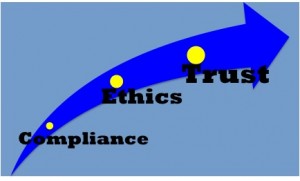Yesterday, at a small holiday gathering someone asked simply, “Does anyone care about Trust Across America-Trust Around the World’s programs?” This year-end post is being written in response to that question.
Trust Across America? Who cares?
Our friends care: We have built a holistic multifunctional circle of friends who have individually (and at times collectively) helped steer us in our mission to build organizational trust.
Our Alliance cares: Now entering it’s 4th year our Trust Alliance has worked collaboratively to publish three award-winning books in our Trust Inc. series, five issues of TRUST! Magazine (the most recent issue being downloaded almost 30,000 times) three annual “Trust Ideas” posters and a host of organizational trust tools, of which virtually none existed before the alliance formed.
Our Top Thought Leaders care: Now in its 6th year Trust Across America’s annual honor is bestowed on the Trust Across America Top Thought Leaders whose daily work helps elevate organizational trust and ethics and who hold this award in high regard on both their websites and in their biographies.
Our Most Trustworthy Public Companies care: Now in its 5th year, this annual honor is given to the “Top 10” Most Trustworthy Public Companies in the US. Many of these companies use this award to recruit new talent and in their marketing and communications messages. Unlike other “Top” awards, companies do not know they are being judged, nor do they participate in the review process.
Researchers care: We maintain the largest living bibliography of trust research (free) thanks to the generosity of one of our friends and colleagues. It’s accessed constantly and updated as researchers contribute new material.
The Media cares: Our press coverage continues to expand.
Our Website Visitors care: Organizations very much care about the subject of organizational trust. Occasionally we audit visitors to the site according to our web stats. Here’s who stops by: repeated visits from Fortune 500 and other multinational companies; federal and state government agencies, both domestic and foreign; universities and colleges around the world; and we’ve even seen some visits from the White House!
Since January 2013, 742,000 visitors have accessed 2,276,000 pages of material. We think that’s quite a bit of caring!!
Cheers to you Bob for challenging me to write this year-end post. And thank you to ALL our friends, Alliance members, Top Thought Leaders, Trustworthy Public Companies, Researchers, Media, website Visitors and Blog Post Readers who care. Without you, there would be a whole lot less trust in the world.
Here’s to more caring in 2016!
Barbara Brooks Kimmel, CEO and Cofounder Trust Across America-Trust Around the World
PS- Drop me a note at barbara@trustacrossamerica.com and let me know you care!



Recent Comments